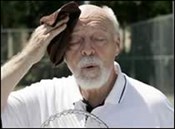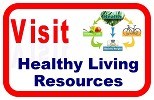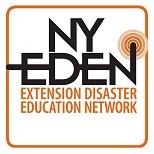Here's some good information from the Center of Disease Control:
Elderly people (that is, people aged 65 years and older) are more prone to heat stress than younger people for several reasons:
- Elderly people do not adjust as well as young people to sudden changes in temperature.
- They are more likely to have a chronic medical condition that changes normal body responses to heat.
- They are more likely to take prescription medicines that impair the body's ability to regulate its temperature or that inhibit perspiration.
Heat Stroke
Heat stroke is the most serious heat-related illness. It occurs when the body becomes unable to control its temperature: the body's temperature rises rapidly, the body loses its ability to sweat, and it is unable to cool down. Body temperatures rise to 106°F or higher within 10 to 15 minutes. Heat stroke can cause death or permanent disability if emergency treatment is not provided.
Signs and Symptoms of Heat Stroke
Warning signs vary but may include the following:
- An extremely high body temperature (above 103°F)
- Red, hot, and dry skin (no sweating)
- Rapid, strong pulse
- Throbbing headache
- Dizziness
- Nausea
Heat Exhaustion
Heat exhaustion is a milder form of heat-related illness that can develop after several days of exposure to high temperatures and inadequate or unbalanced replacement of fluids.
Signs and Symptoms of Heat Exhaustion
Warning signs vary but may include the following:
- Heavy sweating
- Paleness
- Muscle Cramps
- Tiredness
- Weakness
- Dizziness
- Headache
- Nausea or vomiting
- Fainting
- Skin: may be cool and moist
- Pulse rate: fast and weak
- Breathing: fast and shallow
Read more at http://www.bt.cdc.gov/disasters/extremeheat/elderlyheat.asp





